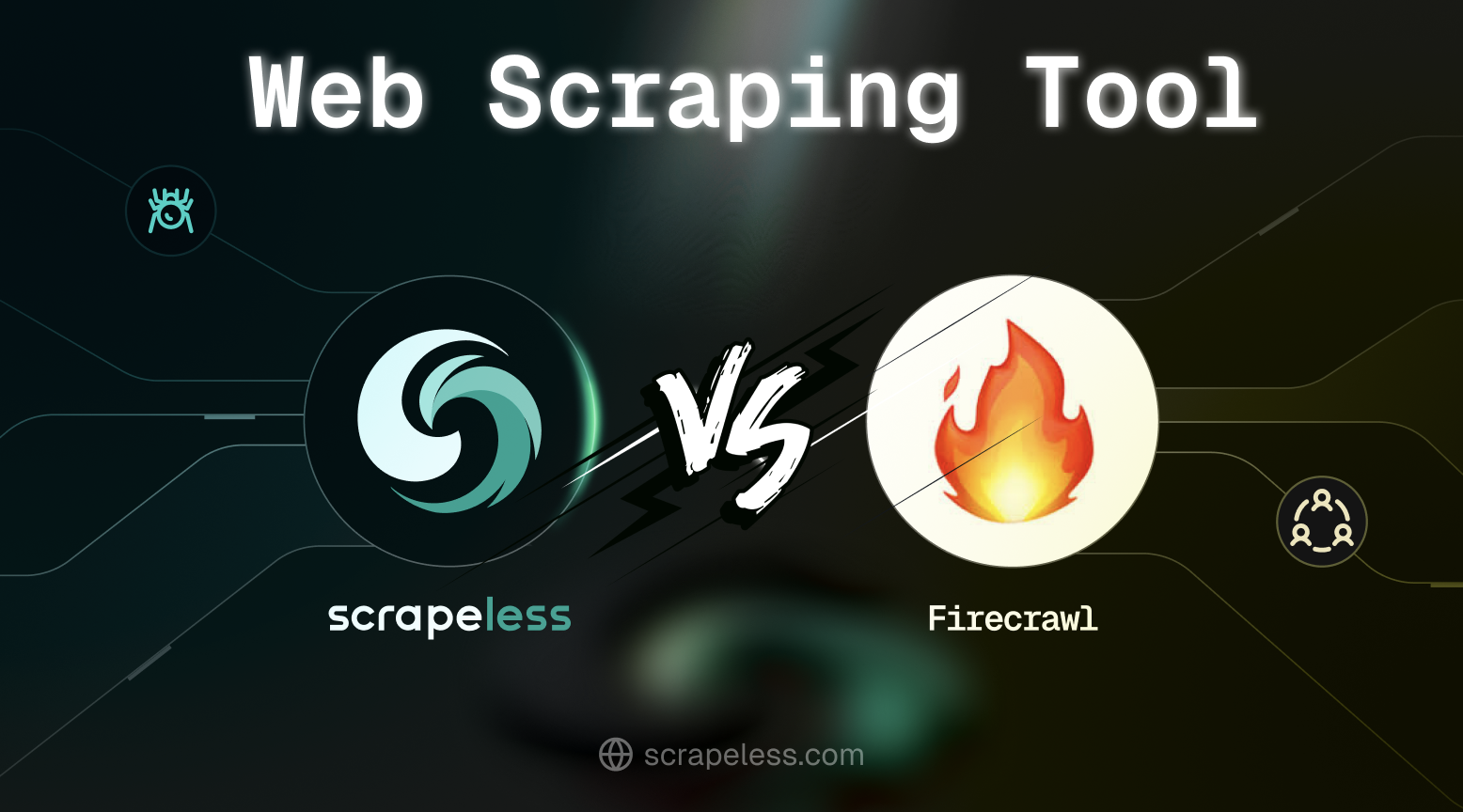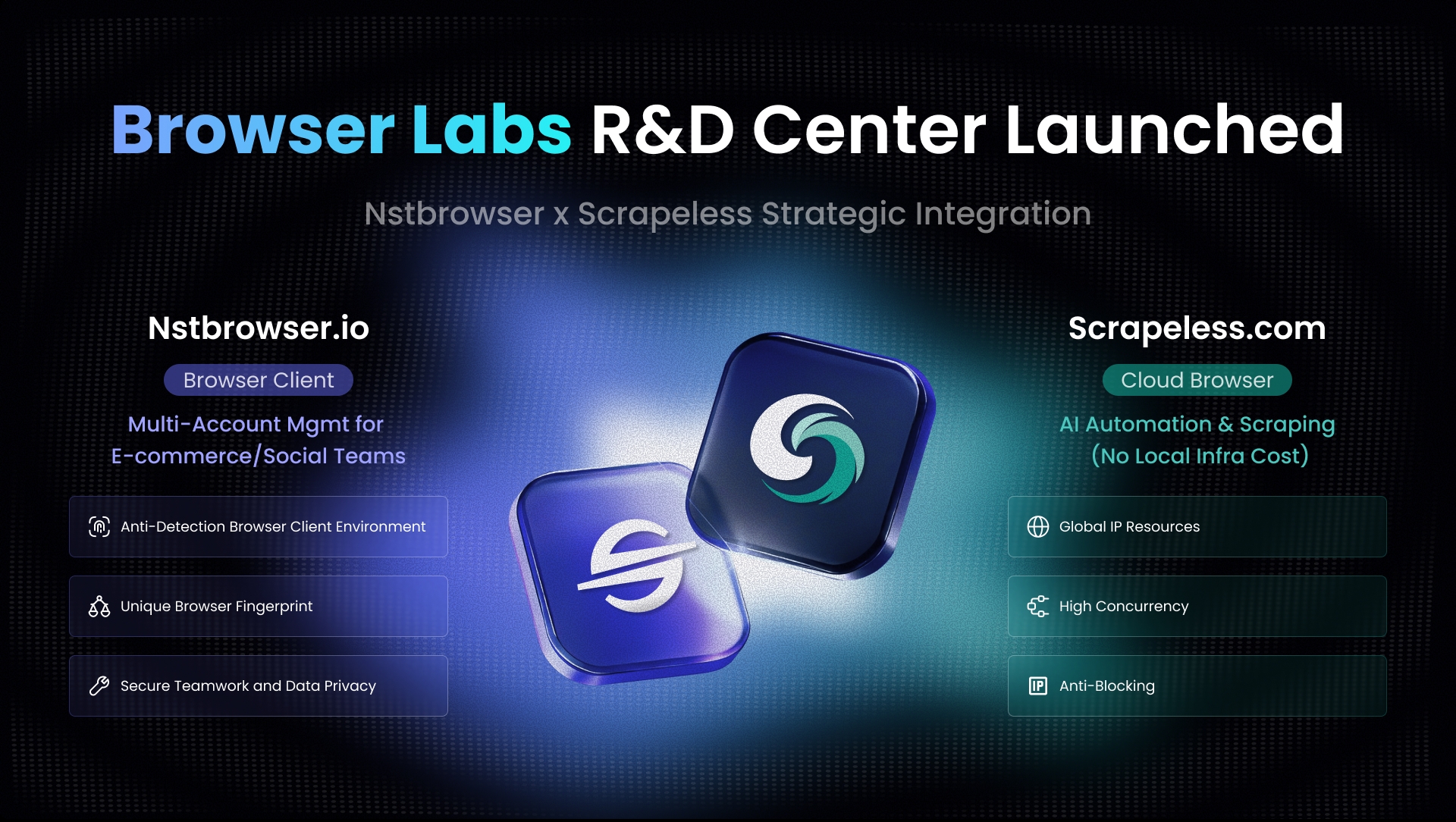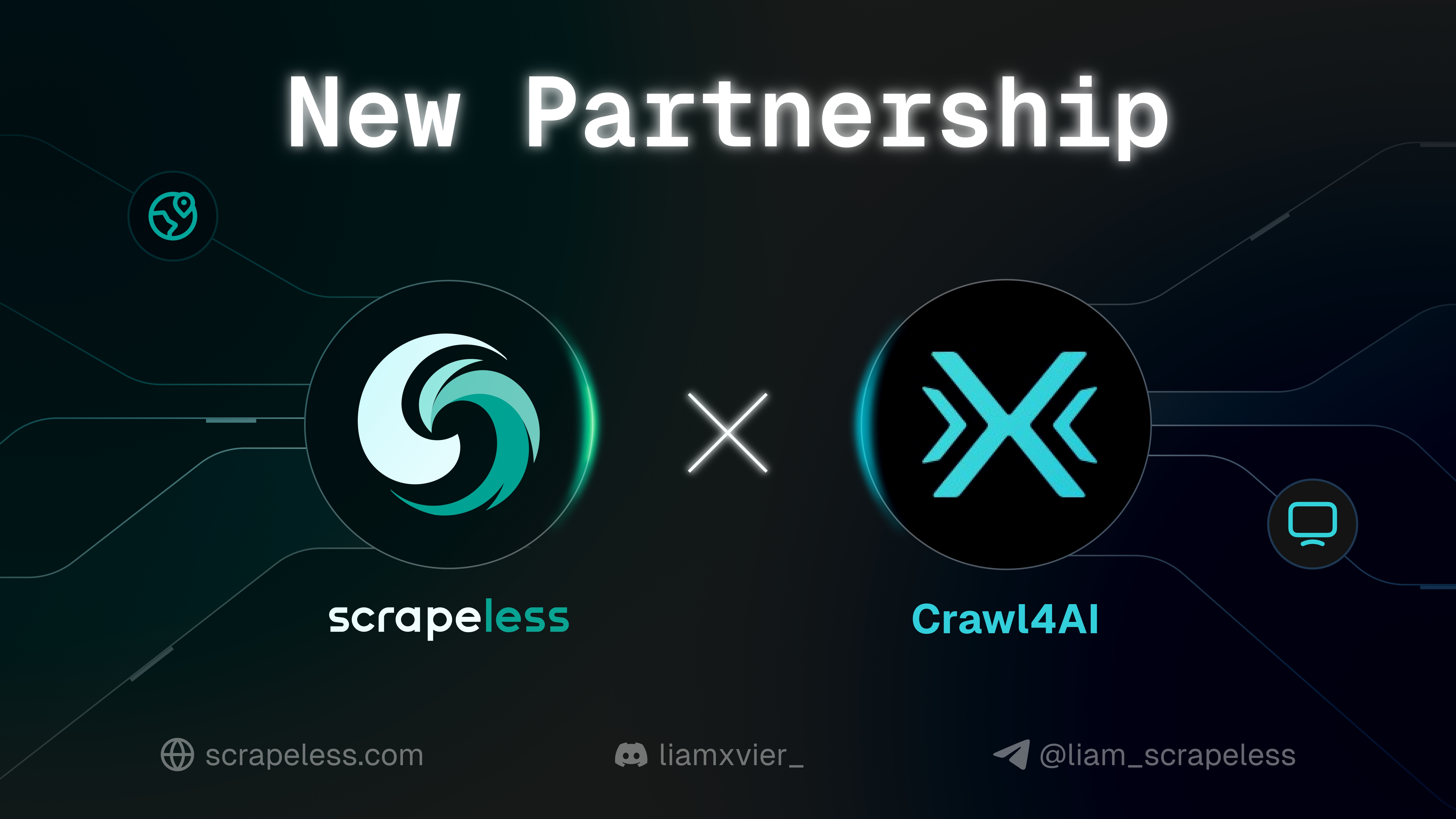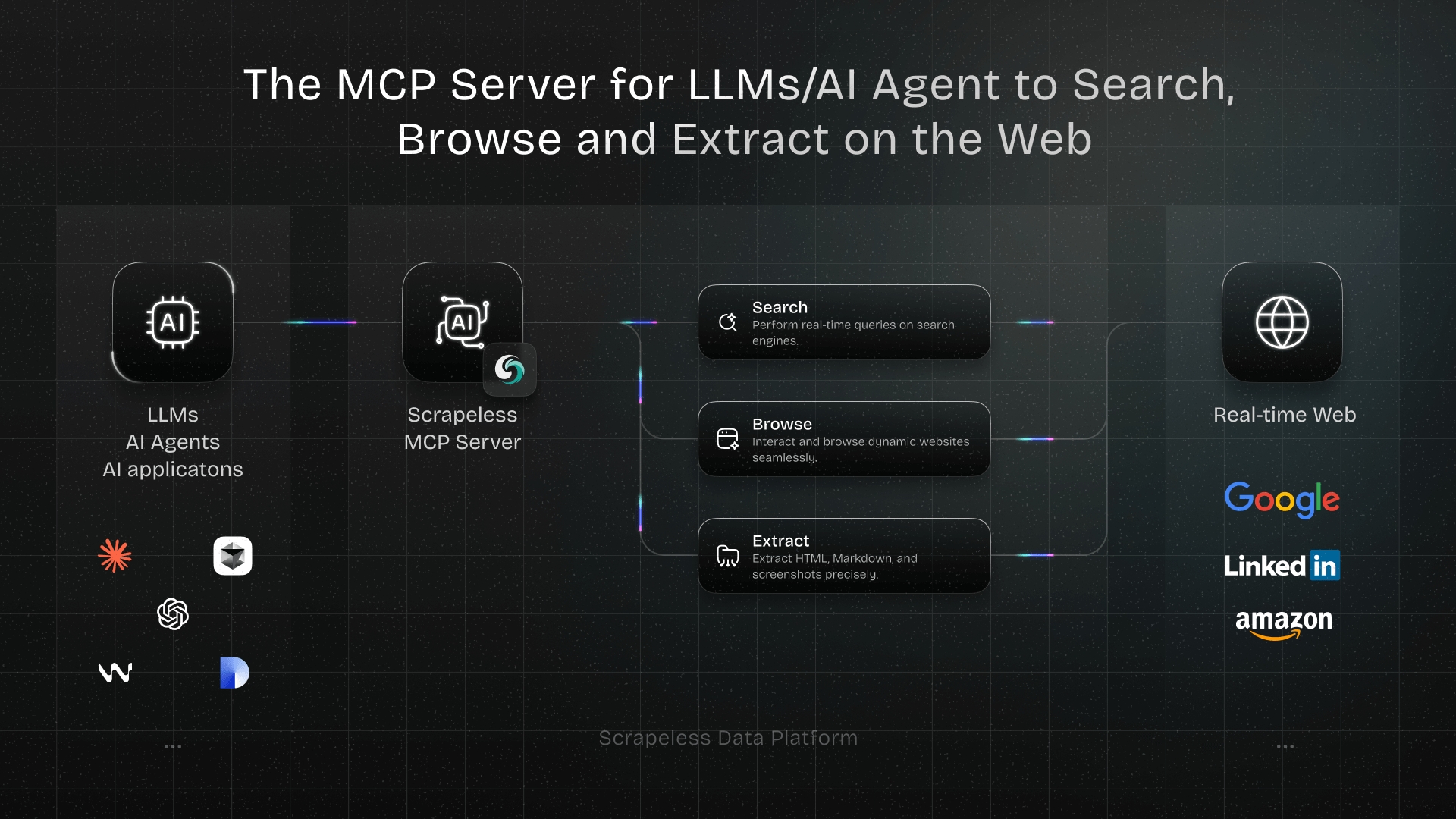Scrapeless Craw vs. Firecrawl: Which One Is Better?
Advanced Data Extraction Specialist
Scraping tools are essential for Internet data collection and are widely used for price monitoring, market information gathering, and building AI datasets. The market offers several mature solutions, including professional crawler tools like Firecrawl and ZenRows, and browser automation solutions based on Puppeteer and Playwright.
Crawl by Scrapeless is specifically designed for enterprise-level data collection, providing efficiency and scalability to meet the rigorous demands of modern crawling tasks.
When selecting the right scraping tool, it's important to consider factors such as data size and application scenarios. In this article, we will compare the performance and cost consumption of Crawl and Firecrawl across five typical scenarios, including e-commerce, news, and social media, to help you choose the best option for your business needs.
Key Feature Comparison
The demands of modern data collection go beyond basic web crawling, and organizations need full-stack solutions that can handle complex scenarios such as CAPTCHA solving, global IP coverage, and high concurrency processing.
Below is an in-depth comparison between Crawl and Firecrawl in terms of key features:
| Features | Crawl | Firecrawl |
|---|---|---|
| Captcha Solving | Free | Paid |
| Proxy | Built-in 195 countries and IP rotation | Only 11 countries |
| Concurrency | 50-unlimited($49/month for 100 concurrency) | 2-100($333/month for 100 concurrency |
| Product Matrix Support | Other product options are available | / |
As you can see from the feature comparison, Crawl has significant advantages in the following key areas:
- Free CAPTCHA support: Built-in automated solution to reduce crawling costs, including reCAPTCHA v2/v3 and Cloudflare Turnsite/Challenge
- Global proxy coverage: 195 country IP pools, especially in high-frequency areas with 100K+ available IPs, starting at $1.8/GB.
- High concurrency capacity: support for different sizes of data crawling needs.
Cost Comparison
Pricing has a direct impact on the cost of running a business, and the significant cost difference between Crawl and Firecrawl in usage scenarios stems from their pricing models.
- Firecrawl: Simple per-request billing (fixed fee per request).
- Crawl: Adopts a more flexible “proxy traffic + hourly rate” hybrid model of billing, starting at only $1.8/GB + $0.09/hour.
Take a typical usage scenario as an example:
If you use both Firecrawl Standard Plan ($99 / month) and Crawl "pay as you go" service, take 1MB page as an example for cost analysis.
| Comparison Dimension | Critical Page Cost | Crawl (per 1000) | Firecrawl (per 1000) |
|---|---|---|---|
| Basic Comparison | 1MB | $2 (default includes JSON and Stealth Mode) | $1 (excludes JSON and Stealth mode) |
| Cost with JSON format enabled | 1MB | $2 (default includes JSON and Stealth Mode) | $5 (JSON format enabled) |
| Cost with JSON + Stealth Mode enabled | 1MB | $2 (default includes JSON and Stealth Mode) | $9 (JSON format and Stealth Mode enabled) |
Below is the cost analysis for Firecrawl when JSON format and Stealth Mode are enabled for critical pages of 2.5MB and 4.5MB.
| Scenario | Critical Page Size | Cost Advantage Situation |
|---|---|---|
| Only enabling JSON format | 2.5MB | page size > 2.5MB, Firecrawl has a cost advantage; page size < 2.5MB, Crawl has a cost advantage. |
| Enabling JSON format and Stealth Mode | 4.5MB | page size > 4.5MB, Firecrawl has a cost advantage; page size < 4.5MB, Crawl has a cost advantage. |
- Market data shows 80-85% of web pages are under 4.5MB (60% under 2.5MB). High-capacity pages mainly appear on e-commerce and streaming media websites. In contrast, news and educational pages using CDN acceleration and code streamlining tend to be smaller.
- Scrapeless will launch a more flexible, separate billing plan for stealth mode to further optimize overall costs.
Usage Case
To provide a more intuitive comparison, we tested multiple pages with various structures and anti-crawling measures, covering scenarios such as e-commerce, social media, travel, technology news, and academic papers.
Each scenario underwent 10 sets of tests, and we analyzed the average data obtained from these tests. |
| Category | Websites | Proxy Cost/1k Requests | Crawl Billing/1k Requests | Crawl Billing/1k Requests (30% Off) | Firecrawl Billing/1k Requests |
|---|---|---|---|---|---|
| E-commerce | costco.com | $5.43 | $6.10 | $4.27 | $5.00 |
| target.com | $5.93 | $6.61 | $4.62 | $5.00 | |
| Academic | sciencedirect.com | $3.45 | $3.88 | $2.71 | $5.00 |
| pubmed.ncbi.nlm.nih.gov | $2.19 | $2.87 | $2.00 | $5.00 | |
| Social Media | threads.com | $3.73 | $3.93 | $2.75 | $5.00 |
| warriorforum.com/ | $9.33 | $9.93 | $6.95 | $5.00 | |
| uadforum.com/community/index.php | $2.27 | $2.52 | $1.76 | $5.00 | |
| Travel | airbnb.com | $6.10 | $6.41 | $4.48 | $5.00 |
| tripadvisor.com | $6.65 | $6.97 | $4.87 | $5.00 | |
| Tech/News | appleinsider.com | $5.42 | $6.44 | $4.50 | $5.00 |
| geekflare.com | $2.08 | $2.45 | $1.71 | $5.00 |
From this, it can be seen that:
Crawl performs exceptionally well on low-traffic pages, but for high-traffic pages, Firecrawl offers a more cost-effective solution.
However, Scrapeless can provide a 70% discount, allowing us to maintain lower costs than Firecrawl even in high-traffic scenarios.
Pros and Cons
Based on the above test results, we can summarize the Pros and Cons of both.
Crawl
- Pros: Strong technical autonomy, exceptional anti-crawling capabilities (CAPTCHA + proxies), high level of functionality integration, and low costs for small to medium pages, making it suitable for large-scale and complex crawling scenarios.
- Cons: Costs for very large pages (>4.5MB) may be higher than Firecrawl.
Firecrawl
- Pros: Simple pricing for large page scenarios, suitable for occasional, single-demand, and small-scale crawling.
- Cons: Expensive functionality charges, weak proxy and concurrency capabilities, making it difficult to support enterprise-level high-frequency complex crawling tasks.
To fully leverage the advantages of Crawl, you can install the Scrapeless Node SDK. Follow the steps below to quickly get started with data collection:
- Run the following npm command for a quick installation:
Bash
npm install @scrapeless-ai/sdk-
Log in to the Scrapeless dashboard and get your API key.
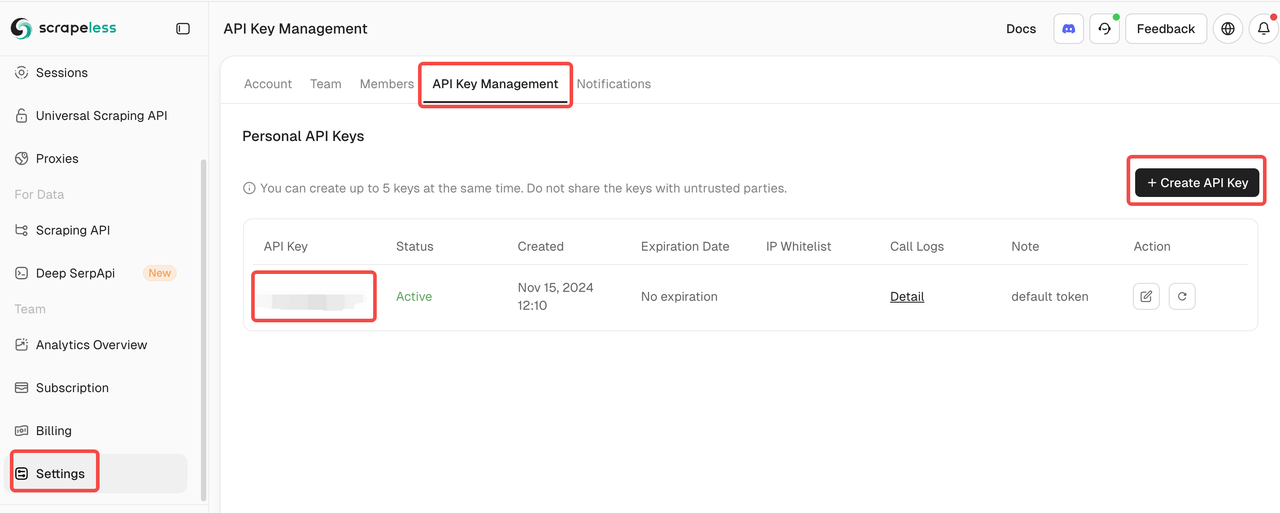
-
Basic Setting
JavaScript
import { Scrapeless } from '@scrapeless-ai/sdk';
// Initialize the clientconst client = new Scrapeless({
apiKey: 'your-api-key' // Get your API key from https://scrapeless.com
});Product Selection:
In addition to Crawl, Scrapeless offers a powerful product matrix that addresses various needs. For Js rendering issues, there is the Universal Scraping API, and for complex scenarios, the Browser solution can be utilized to meet diverse requirements. Please refer to the table below.
| Feature | Scrapeless Crawl | Scrapeless Browser | Scrapeless Universal Scraping API | Firecrawl |
|---|---|---|---|---|
| JS Rendering | ✅ | ✅ | ||
| Batch Crawling & Multi-format Data Capture | ✅ | |||
| Automation | ✅ | ✅ | ||
| Strict Anti-crawling Measures | ✅ | ✅ | ||
| High Concurrency | ✅ | ✅ | ✅ |
Summary:
Firecrawl offers lower costs when handling large pages (over 4.5MB), and its pay-per-use pricing model is straightforward, making it more suitable for personal projects or AI testing scenarios.
In contrast, Crawl leverages its proprietary core, high concurrency technology, and its hybrid pricing model effectively balances cost and efficiency, making it more suitable for enterprise-level large-scale crawling needs.
At Scrapeless, we only access publicly available data while strictly complying with applicable laws, regulations, and website privacy policies. The content in this blog is for demonstration purposes only and does not involve any illegal or infringing activities. We make no guarantees and disclaim all liability for the use of information from this blog or third-party links. Before engaging in any scraping activities, consult your legal advisor and review the target website's terms of service or obtain the necessary permissions.
